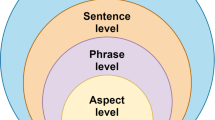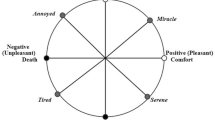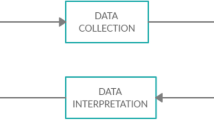Abstract
Sentiment Text Tagging System (STTS) with Thai sentiment resource has been developed and used to tag emotions directly to words and sentences in Thai children stories. The Thai sentiment resource, developed from SenticNet2 resource, groups emotions into four independent but concomitant dimensions: pleasantness, attention, sensitivity and aptitude. The measure of each dimension is called a sentic value of that dimension. Thai sentiment resource stores each word’s sentic value and polarity value, a value calculated from the sentic value, in the form of floating point number. The resource was constructed from bi-directional translation of 14,244 English terms in SenticNet2 into 16,584 Thai terms. The main purpose of this study was to implement a sentiment analysis of Thai children stories system with support vector machine using a set of proposed discriminating features for classifying emotions. It was found that the system can achieve 75.67 % of accuracy.






Similar content being viewed by others
References
Ai D, Zheng Y, Zhang D (2010) Automatic text summarization based on latent semantic indexing. Artif Life Robot 15(1):25–29
Pasupa K, Netisopakul P (2011) Thai paragraph shortening based on binary classification model. In: Proceeding of the joint International symposium on natural language processing and agricultural ontology service. Bangkok, Thailand, pp 181–185
Marino JB, Banchs RE, Crego JM, de Gispert A, Lambert P, Fonollosa JA, Costa-Jussà MR (2006) N-gram-based machine translation. Comput Linguist 32(4):527–549
Mudinas A, Zhang D, Levene M (2012) Combining lexicon and learning based approaches for concept-level sentiment analysis. In: Proceedings of the 1st International workshop on issues of sentiment discovery and opinion mining. Beijing, China, pp 1–8
Rosenthal S, Ritter A, Nakov P, Stoyanov V (2014) SemeEal-2014 Task 9: Sentiment analysis in twitter. In: Proceedings of the 8th International workshop on semantic evaluation. Dublin, Ireland, pp 73–80
Haruechaiyasak C, Kongthon A, Palingoon P, Trakultaweekoon K (2013) S-Sense: a sentiment analysis framework for social media sensing. In: Proceedings of the IJCNLP 2013 workshop on natural language processing for social media. Nagoya, Japan, pp 6–13
Lertsuksakda R, Netisopakul P, Pasupa K (2014) Thai sentiment terms construction using the hourglass of emotions. In: Proceeding of the 6th International conference on knowledge and smart technology. Chonburi, Thailand, pp 46–50
Cambria E, Havasi C, Hussain A (2012) SenticNet 2: a semantic and affective resource for opinion mining and sentiment analysis. In: Proceeding of the International Florida Artificial Intelligence Research Society. Marco Island, Florida, USA, pp 202–207
Sudprasert S (2004) KUCut Thai word segmentor (online). https://bitbucket.org/veer66/kucut/. Accessed 18 Mar 2016
de Kok D (2014) Jitar HMM part of speech tagger (online). https://github.com/danieldk/jitar/. Accessed 18 Mar 2016
Cambria E, Livingstone A, Hussain A (2012) The hourglass of emotions. In: Proceeding of the COST 2102 International Training School on Cognitive Behavioural Systems. Dresden, Germany, pp 144–157
Plutchik R, Kellerman H (1980) Emotion: theory, research and experience. Academic Press, London
Cortes C, Vapnik V (1995) Support-vector networks. Mach learn 20(3):273–297
Netisopakul P, Wikaha P (2013) Speaker identification from multiple short stories without an avatar list. In: Proceeding of the 10th Symposium on natural language processing. Phuket, Thailand, pp 1–7
Author information
Authors and Affiliations
Corresponding author
Additional information
This work was presented in part at the 20th International Symposium on Artificial Life and Robotics, Beppu, Oita, January 21–23, 2015.
About this article
Cite this article
Pasupa, K., Netisopakul, P. & Lertsuksakda, R. Sentiment analysis of Thai children stories. Artif Life Robotics 21, 357–364 (2016). https://doi.org/10.1007/s10015-016-0283-8
Received:
Accepted:
Published:
Issue Date:
DOI: https://doi.org/10.1007/s10015-016-0283-8




